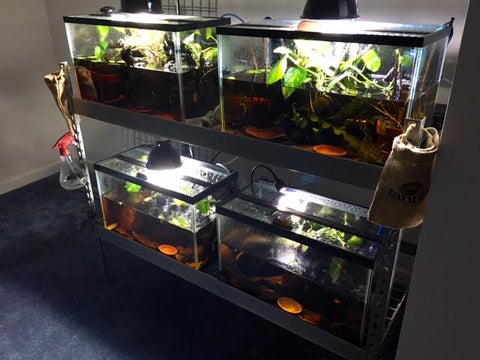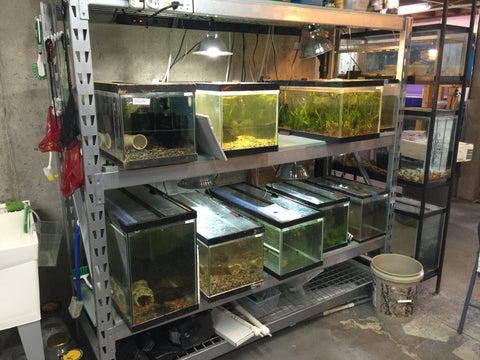- Continue Shopping
- Your Cart is Empty
A message of hope from the "watering hole" that is the LFS...
Today, I felt a little more uplifted by some experiences so far this weekend, so I’m putting my usual grumpy, cynical, sarcastic self on the back burner for the day to give us a little lift. That’s right- I’m praising us for a change. Don’t worry, I haven’t gone “soft”…By tomorrow, I’ll have something to rail about, trust me. :)

I had occasion to go to one of my local fish stores this weekend (Hey, I’m a fish geek, right? It’s still fun!), and, amid the usual hustle, bustle, and hobbyist banter, I made a social observation:
When you think about it, we as hardcore fish geeks (Okay, aquarium hobbyists in general, but hardcore fish geeks in particular, really) have an incredible amount of knowledge about some very arcane facts, don’t we? ( So says the guy who is obsessed with decomposing leaves in his aquariums…)
“Phosphate”, “dirted tanks”, “aufwuchs”, “ferric aluminum oxide”, “Laetacara thayeri” , “zeolites”, “reverse osmosis”, “magnesium levels”, and “ORP” were some of the words I heard in discussions upon entering the shop. You know, those little discussions that take place between fish geeks in odd corners of the LFS, when contemplating which fish to buy, etc…One of the best parts of fish-geek culture and an advantage of hanging out at the metaphorical “watering hole” that is the LFS.

It was sort of like like attending a fish club meeting or convention. And in a way, it was. Yeah. Absolutely.
The LFS is to our culture what the "watering hole" is to animals in the African Savannah ..A place to gather, refresh...and in our case, exchange information! )In a typically "predator-free" environment, if you don't count the guy trying to hawk "LE" coral frags from his tank...)
In one 15 minute stretch, I heard an outwardly scary looking, biker-type guy giving a very detailed, lucid, and informative dissertation to a couple of other customers on the topic of phosphate in the reef aquairum, and its good and bad effects on corals, complete with personal experience references and admission that some of his theories might be anecdotal…And “Q and A!” I mean, really impressive!

I also listened in on a rather vigorous discussion on the merits of water changes conducted by a “Scary cat lady” kind of person (sorry for the cruel stereotype, but I’m being serious here! And then there was the “Emo”girl with the fuscia hair and tats, talking about how she grows Paramecium for the Boraras she’s spawning….It all goes to show that you can’t judge a book by its cover, like the old adage goes- and that there is no information like that which you receive from those who are actually working on the things they’re talking about!
More important, it shows that, as hobbyists, we are an incredibly well-studied, intellectually curious bunch, regardless of our educational backgrounds, ethnicity, appearance, gender, etc. As it should be. And most important of all- we share our knowledge with others quite readily, and a lot of the knowledge is NOT “regurgitated” stuff-you know, the stuff that gets me all worked up on these pages. Rather, it’s hard-earned, real world information, typically gleaned by years of actual practice in our own aquariums, making it the most valuable kind of information available, IMHO.
What I find truly fascinating about our hobby is the level on which the average hobbyist is operating. Many of us run systems with tight control and understanding of many, many aspects of the environment, with tremendous insight on just why each of the perimeters we obsess over is so important. That’s really cool, because we are not just following some kind of “orders” from some anonymous “hobby force” up there that tells us to keep our nitrates at 0-10ppm, or our photoperiod at “X” hours per day…Rather, we’re arriving at some of these “hobby norms” because we’re observing and tweaking our systems based on what works best for our fishes and plants…crazy concept, huh?

What’s more, is that we have a bunch of you out there who “dare” fly in the face of convention, asking why we have to do things a certain way, when your real world results prove that success can be achieved in a completely different manner. Hobbyists who are willing to risk their reputation, animals, and money because they think that they might have a better way. This is how hobby breakthroughs are achieved. At a very grass-roots level, by those who dare. Very cool stuff.

Another observation: It seams like a lot of hobbyists got their start by…whoa…picking up a book, or reading information on the internet, then perusing forums and getting feedback and guidance from fellow hobbyist who took the time to act as “mentors.” We have a really great “hobby cultural” thing going here, don’t we? It’s not just hobbyists receiving advice from people who are trying to sell them stuff. Rather, we’re getting advice from others who’ve walked in our shoes…Clubs, conferences, and online forums and Facebook groups have completely transformed the hobby.

I’m kind of curious how many of you have a “mentor”, or did you slug it out alone? Seems like these days, there are fewer and fewer hobbyists who got their start figuring out stuff without at least some input from others. What a cool thing!
So, in conclusion, I’m not sure exactly how we arrived at the state we’re in as a hobby right now, but on the whole, it’s pretty darned good!

Okay, we could do without “Parrot Cichlids”, Photoshopped pics, “check out my rare Discus collection” threads, obscenely expensive “microchip-sized” coral frags, blah,blah, blah…
And long live the LFS!
Until next time, keep sharing, keep learning, and…
Stay wet.
Scott Fellman
Tannin Aquatics










Scott Fellman
Author